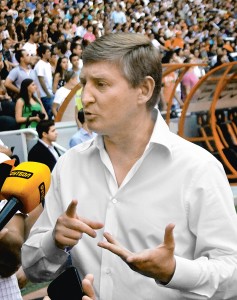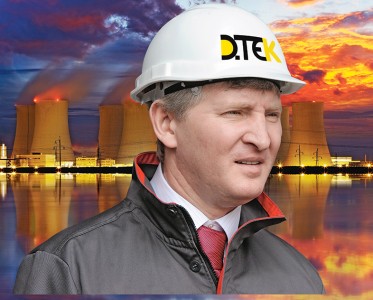An attack by international creditors and the collapse of DTEK in an “evolutionary” way could be another way to force Akhmetov to retrain from an oligarch to a major businessman
The owner of SCM and so far the richest businessman in Ukraine, Rinat Akhmetov, has to protect his energy business from attacks from all fronts. On the one hand, Akhmetov’s enterprises are literally under fire in the ATO zone. On the other hand, it is attacked by the Ministry of Energy and Coal Industry and the National Electricity and Utilities Regulatory Commission, accusing the company of monopolizing the thermal energy industry. On the third side, Akhmetov’s longtime enemy Igor Kolomoisky, in parallel with the Prosecutor General’s Office, is challenging in the courts the privatization of a number of key enterprises (“Zakhidenergo”, “Dniproenergo”, “Dneprooblenergo”). And finally, the fourth front is international, where DTEK’s creditors are demanding that the group repay debts amounting to $3 billion.
According to the director of the company, Maxim Timchenko, about a third of the debt consists of obligations on Eurobonds, but the bulk of it belongs to foreign banks, including the Dutch ING, the Italian UniCredit and the Austrian Erste Bank and Raiffeisen Bank. “We have begun formal negotiations with all these banks regarding the restructuring of our debt for the long term,” Timchenko said last week, adding that the armed conflict in Ukraine has negatively impacted the company’s activities. “It has become simply impossible to service our debt,” he complained.
The company ended last year with a net loss of UAH 19.6 billion, while in 2013 it received a net profit of UAH 3.3 billion. In March, the international rating agency Fitch downgraded the company’s rating to C, which means “default is inevitable.” And although at the end of April Akhmetov’s company won a small victory by agreeing with creditors to restructure the Eurobond debt in the amount of $200 million, the main negotiations are still ahead. And it’s not a fact that they will end positively, because the problems of Akhmetov’s energy group in Ukraine are only gaining momentum.
If the AMCU begins to consider thermal generation as a separate market, this may become a clue due to which DTEK may be forced to get rid of “extra assets.” There is already an example to follow – in 2001, the AMCU ordered Sun Interbrew to sell the Crimea brewery after the market share of this corporation exceeded the legal limit of 35%
First, DTEK was deprived of subsidy certificates that made it profitable to export electricity to Europe. Then the National Commission for the Regulation of Electricity and Utilities decided not to pay Akhmetov’s company for the electricity produced in the ATO zone. And the Ministry of Energy and Coal Industry refused to increase the purchase price of coal by a third, to 1.5 thousand UAH/t, as the company demanded. All this gave DTEK reason to believe that the authorities deliberately launched a war against it. The company’s business development director, Vitaly Butenko, openly stated that the new government has more than once offered DTEK to sell its assets, in particular Zakhidenergo and Dneprenergo. In response, Akhmetov’s managers even allegedly developed the “Fortress” plan, which describes steps to protect the business and discredit the authorities, although the company denies its authorship.
Meanwhile, the offensive against Akhmetov’s positions is intensifying, and, as expected, the Antimonopoly Committee may soon open a new front against him. At the end of May, it was headed by the former deputy director for legal issues of the ArcelorMittal Krivoy Rog plant, Yuri Terentyev. According to “DS” interlocutors in the Presidential Administration, one of Terentyev’s priority goals will be precisely the destruction of the energy monopoly of DTEK, which his predecessors did not notice point-blank, and sometimes, on the contrary, changed the standards so as to allow Akhmetov to calmly expand, buying up more and more energy resources. assets. Although DTEK does not consider itself a monopoly, despite the fact that the group’s companies produce half of the country’s coal and control almost 70% of thermal generation capacity. The company says that most of the coal it produces does not go to market, but is burned at its own stations. And DTEK estimates its share in electricity generation at 30%, taking into account its total production, including at the Energoatom nuclear power plant.

However, if the AMCU begins to consider thermal generation as a separate market, this may become a clue due to which DTEK may be forced to get rid of “extra assets.” The authorities plan to destroy Akhmetov’s empire by the end of this year. And any negotiations with him can be aimed at achieving this goal. However, it is unlikely that Rinat Leonidovich himself would accept such an “offer” and surrender without a fight. In addition, the initiators of “dekulakization” themselves are unlikely to be able to bring their plans to their logical conclusion, given the size of DTEK that is targeted.
There is already an example to follow – in 2001, the AMCU ordered Sun Interbrew to sell a controlling stake in the Crimea brewery after the brewing corporation’s market share exceeded the legal limit of 35%. The buyer of this asset then became the Donetsk Sarmat group, which was under the control of Akhmetov. And in this regard, the attack of international creditors and the collapse of DTEK in an “evolutionary” way could become another way to force Rinat Akhmetov to retrain from an energy oligarch into simply a big businessman.
Published in the weekly “Business Capital” dated June 8, 2015 (No. 23/733)









